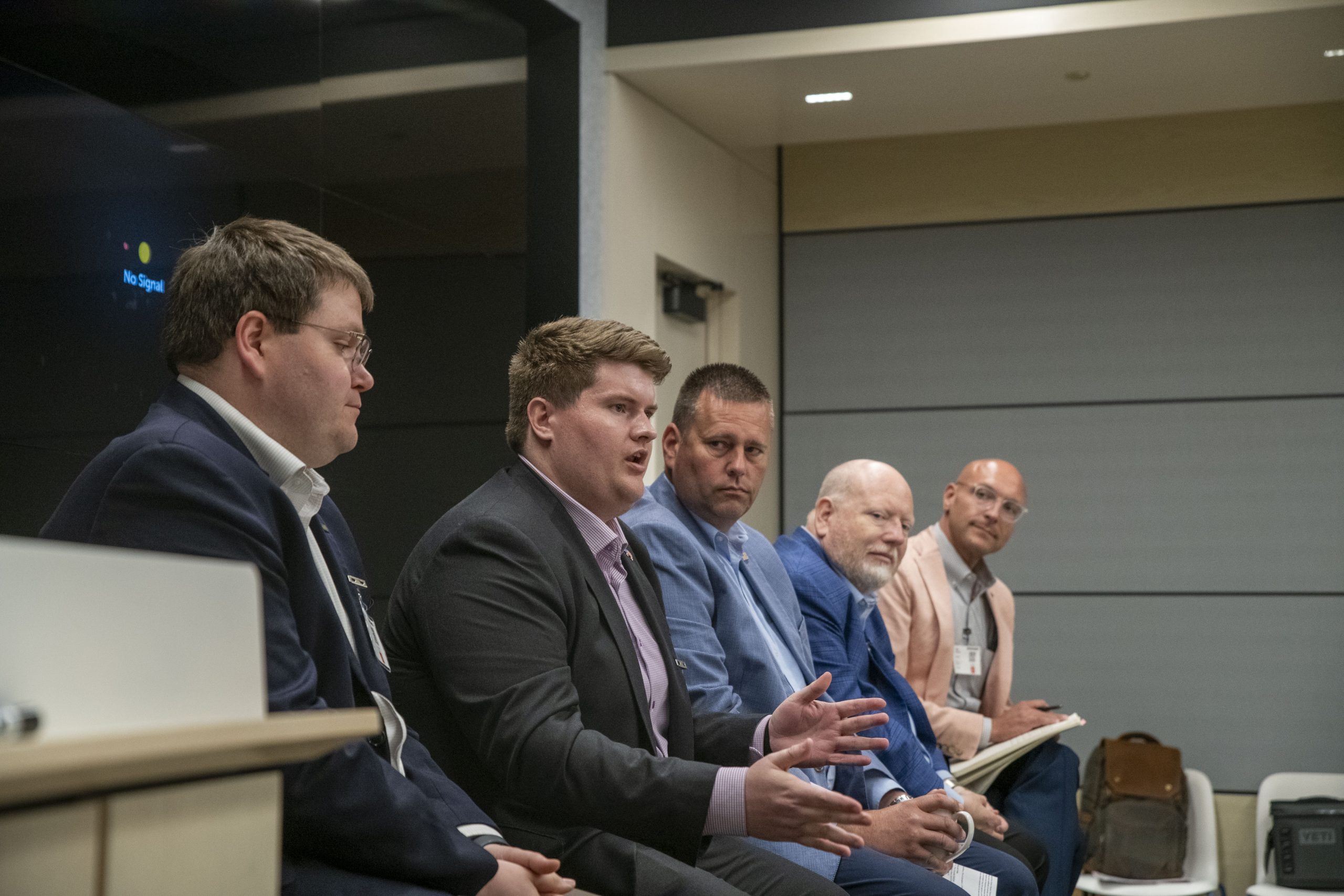
Panelists at the “Tackling Tough Conversations” discussion at ACN’s Regional Workshop May 14 in Chicago include, from left: Andrew Larson, Cole Spain, Kevin Johnson and John Herath. Photo by Katie Knapp
By Mike Pearson
During the Spring 2025 Regional Workshop at McDonald’s corporate headquarters in Chicago on May 14th, it was my pleasure to moderate a panel discussion called “Tackling Tough Conversations”. The discussion centered on how agricultural journalists can effectively cover contentious issues without alienating their rural audiences. Our panelists included:
- Andrew Larson, Director of Government Relations, Illinois Soybean Association
- Cole Spain, Manager of International Affairs, National Pork Producers Council
- John Herath, Assistant Vice President of Communications, U.S. Meat Export Federation
- Kevin “KJ” Johnson, President & CEO, Illinois Fertilizer & Chemical Association
The conversation was off the record, so everyone in the room could feel comfortable discussing the topics.
Tariffs: A Divisive Topic
For most of the first hour of discussion, the conversation focused on tariffs—a subject that has created a noticeable divide between ag organizations and individual farmers. While many producer groups express concern over increased tariffs, fearing retaliatory measures from trade partners that could hurt U.S. agriculture, polls indicate that most farmers continue to support the administration’s trade policies, trusting in their long-term benefits.
This split creates a conundrum for journalists: how to report on such issues without alienating either side.
Beyond Tariffs: Other Contentious Issues
After touring McDonald’s facility, the group returned for another hour of discussion; this time with more fraught issues up for discussion:
- PFAS Contamination: Known as “forever chemicals,” PFAS have been found in water, soil, and air, posing health risks and leading to land-use restrictions for farmers. Regulations are starting to catch PFAS, and the impact on agriculture could be huge
- Biofuels and the Renewable Fuel Standard (RFS): For many years, the biofuels conversation was a simple one: biofuels are good for agriculture. They drive demand, reduce oil reliance and promote energy independence. But as the industry has matured, policy discussions now tend to benefit specific feedstocks, which leads to rifts between commodity organizations: some in favor of particular biofuels policies and others opposed.
- Glyphosate and Pesticide Use: Another percolating issue is the Make America Healthy Again movement and the focus it is putting on crop protection chemicals and farm production practices. Concern that a lack of factual, scientific information could shape policy in a way that hurts farmers’ ability to produce is real.
Strategies for Journalists
Between our panelists and the audience, several strategies to handle these issues came up:
- Tell Individual Stories: Instead of attempting to cover the entire scope of global trade policies or environmental issues, focus on individual narratives that illustrate the real-world impact on farmers and communities.
- Acknowledge Information Gaps: With changes in administration personnel, traditional sources may no longer be available. Being transparent about these gaps can build trust with your audience.
- Exercise Strategic Silence: Not every issue requires immediate coverage. Sometimes, choosing not to report on a topic can prevent unnecessary amplification of divisive narratives.
- Embrace Continuous Storytelling: Build a broader narrative through a series of interconnected stories, providing depth and context over time.
* Highlight Underreported Initiatives: Many associations undertake innovative projects that go unnoticed. By shedding light on these efforts, journalists can offer fresh, engaging content that resonates with their audience.
Conclusion
It was a great discussion around lots of big issues that will surely be driving headlines over the next year; and it was an excellent networking opportunity for those of us who attended. I know I left with several ideas to improve my stories on these issues and a fresh energy to tell those stories that matter.
– Pearson is director of broadcasting at Farm Progress
